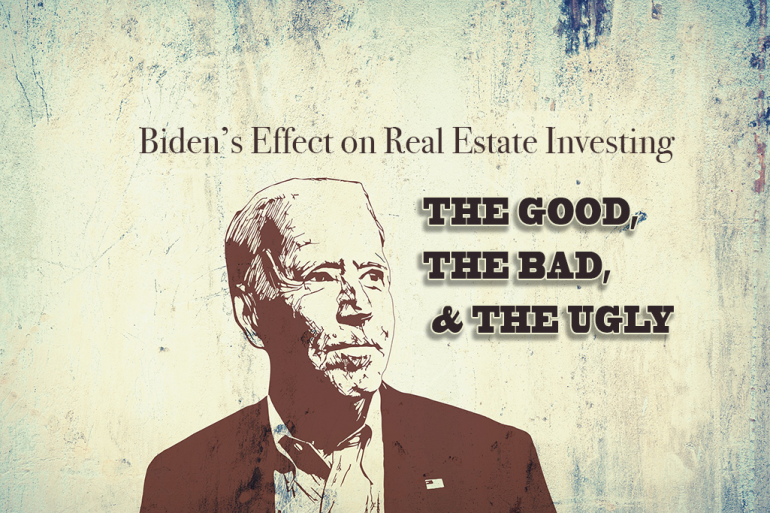Biden’s Effect on Real Estate: The Good, the Bad, and the Ugly!
To the delight of some and the disappointment of others, Joe Biden is the new president of the United States. Like with every new administration, investors are wondering what Biden’s effect on real estate will be.
The Biden administration has long signaled policies that would repeal many long-standing tax breaks and aim to bolster homeownership for lower-income Americans.
The Good: Aggressive COVID-19 Vaccinations
Biden isn’t mincing words or politics with this one. Everyone knows his administration is going to address the pandemic head-on with a giant show of unity.
Regardless of how quickly the Biden administration succeeds at making a dent in the pandemic, showing confidence and consistent messaging is almost as important. The less confusion there is, the more confident people will be about the economy and the real estate market. No matter which side of the political spectrum and pandemic issues you are on, this is good for everyone. Confusion creates insecurity and can lead to more panic.
President Joe Biden said Monday he thinks the U.S. could top 1.5 million vaccinations per day, up from his target of 1 million per day.
The previous administration had already hit the 1 million per day vaccination mark, so Biden is shooting for 1.5 million per day because, well, why not?
“Time is of the essence,” Biden said. “We’re trying to get out a minimum of 100 million vaccinations in 100 days and move in the direction where we are well beyond that in the next 100 days, so we can get to the point where we reach herd immunity in a country of over 300 million people.”
The sooner we get to herd immunity, the sooner more homeowners will feel comfortable making moves in the market. The tight inventory has been driving up prices but also suppressing overall sales.
When things get back to normal, many analysts expect prices to take a dip at first as more inventory inevitably comes online. Once the immediate glut of inventory is digested by the market, real estate markets will balance once again.
Right now, the commercial real estate sector prospects short and medium range are bleak. With an aggressive vaccine rollout, the biggest winner when we reach herd immunity and the psychology of that will be commercial real estate.
As the fear of the virus wanes, patrons will come flocking back to restaurants and workers will come back to their offices, rents will reach their landlords, mortgages will be paid, and spaces will be bought, leased, and sold. The market will heal itself.
The Pretty Good: $15,000 First-Time Homebuyer Tax Credit
The first-time homebuyer credit was a tax credit for individuals and families who purchased a new home between April 9, 2008, and April 30, 2010, according to the IRS. It was originally used by both the Bush and Obama administrations to bolster housing market prices. Biden is going to use it to make home purchasing more affordable for low-income buyers.
President Biden’s plan to expand access to affordable housing calls for creating a new refundable tax credit of up to $15,000 for first-time homebuyers. The credit would be paid when qualified taxpayers purchase a home instead of when they file their tax return the following year.
For many who have never owned a home, the down payment is the number-one reason why. This credit would allow many to jump into the home-buying market that had no chance before.
Good for the homebuyers, or is it? While it will help first-time homebuyers get into their first house, it will also drive up the prices of the starter houses and lower-income neighborhoods that first-time homebuyers are competing for. That’s not so great for these buyers.
This Biden administration real estate policy is pretty good in the short term. As for the mid- to long-term affordability of these properties, it’s perhaps not so good after all.
The Bad: Executive Order Extending Foreclosure & Eviction Moratorium
In one of his first acts as president, Joe Biden extended a federal moratorium on evictions and foreclosures. While people shouldn’t be kicked out in the middle of the pandemic, there are better ways of dealing with the issue. Restricting landowners’ rights by removing their ability to collect rent from their property is not the right way.
Federal payment assistance for tenants who are sick or at risk of becoming ill — tenants who truly have no other way of affording their housing — is a better solution. Currently, many landlords have no way to collect rent to pay their mortgages, setting them up to be foreclosed on quickly once the pandemic is over or has eased.
Simply waving a wand and preventing a foreclosure case is a bad legal precedent and bad for the entire real estate ecosystem. The executive order only extends the foreclosure moratorium on government-backed mortgages, including those backed by the USDA, VA, and HUD.
Slowing down the pace of foreclosures also sets up another giant glut of foreclosures in the near future. The court system is already far behind on cases due to COVID-19 forcing virtual hearings and preventing many counties from holding in-person hearings altogether.
There will be huge delays in the normal foreclosure processes, and as we saw in the past it created masses of zombie foreclosures, neighborhood blight, and underperforming market prices due to large inventories of distressed properties coming online at the same time.
Policies like these create uncertainty and shake investor confidence. There should never be a time we create a situation where someone can take or occupy another person’s property without payment or recourse to collect payment.
The Ugly: Elimination of Many Real Estate Tax Breaks
The Biden tax plan would eliminate:
1. The $25,000 exemption from the passive loss rules for rental real estate losses incurred by middle-income individuals
2. Section 1031 like-kind exchanges that allow deferral of capital gains taxes on swaps of appreciated real property
3. Rules that allow faster depreciation write-offs for certain real property
4. Qualified business income (QBI) deductions for profitable rental real estate activities
The Biden administration has seemingly declared an all-out war on real estate investors. While on the surface it seems to be a fast way to bring in extra tax revenue, it will undoubtedly slow down real estate investments, especially in communities investors are most active in (C- and D-class neighborhoods).
The 1031 exchanges allow real estate investors to defer tax payments after they sell real estate — provided that the investor subsequently reinvests in another property. It’s a huge benefit to investors, but that benefit does not create large amounts of buying and selling and neighborhood improvement activity that helps so many others.
The agents get more commissions on more deals, lenders get more borrowers, property prices go up from increased demand, more rentals are on the market for tenants, and municipalities and counties get higher non-homesteaded property taxes.
In fact, the 1031 exchange effect was studied in 2015 by David C. Ling and Milena Petrova of the Universities of Florida and Syracuse. They published The Economic Impact of Repealing or Limiting Section 1031 Like-Kind Exchanges in Real Estate. The conclusion of the article was that, in the long run, eliminating 1031 exchanges would increase rents 8-13% by restricting the number of rentals on the market, especially in high-tax states.
They also concluded:
In contrast to the common view that replacement properties in an exchange are frequently disposed of in a subsequent exchange to potentially avoid capital gain and depreciation tax liability indefinitely, we find that in 88 percent of those cases in our dataset investors dispose of properties acquired in a 1031 exchange through a taxable sale.
Therefore, we conclude that eliminating like-kind exchanges will lead to increases in holding periods, all else being equal. This loss of liquidity will adversely affect investors and increase the required risk premiums, thereby putting downward pressure on prices.
Eliminating the above tax breaks and strategies real estate investors receive for activity in the real estate market would have a severe effect on the market. It’s short-sighted and unfortunately largely the victim of the typical left vs right and a continuation of the past two decades of the war on the 1%.
Those on the other side of the debate will surely see it as a way of levelling the playing field by distributing the wealth from the rich to the poor in the form of higher taxation.
One thing is for certain: Neither the anti-tax nor the pro-tax proponents will change the other’s mind.
In the end, successful investors adapt as they always have and will find a way to prosper in any market. Make sure you educate yourself on how to pivot and survive in this new evolving market, and don’t get left behind.








